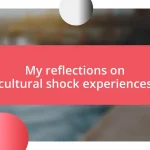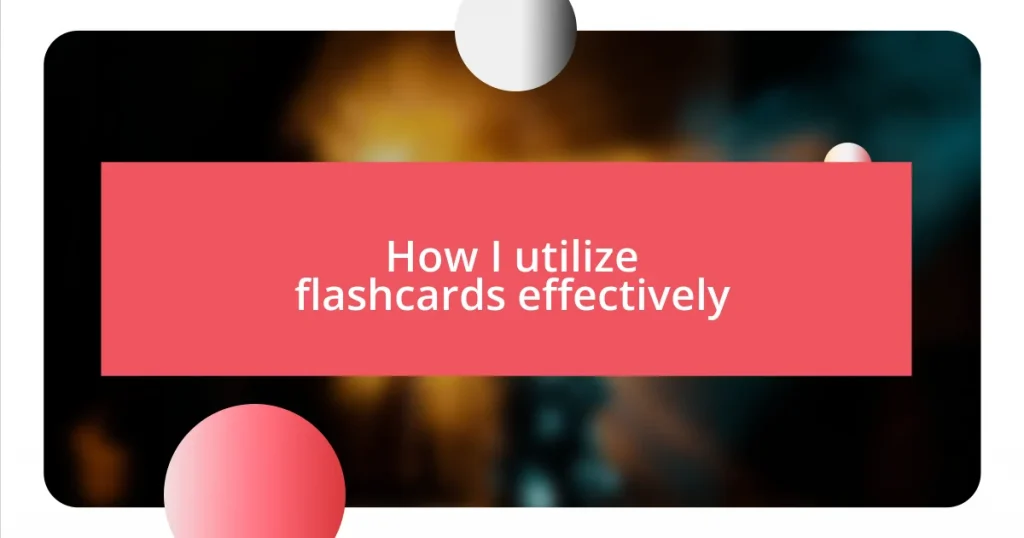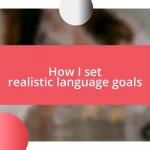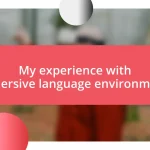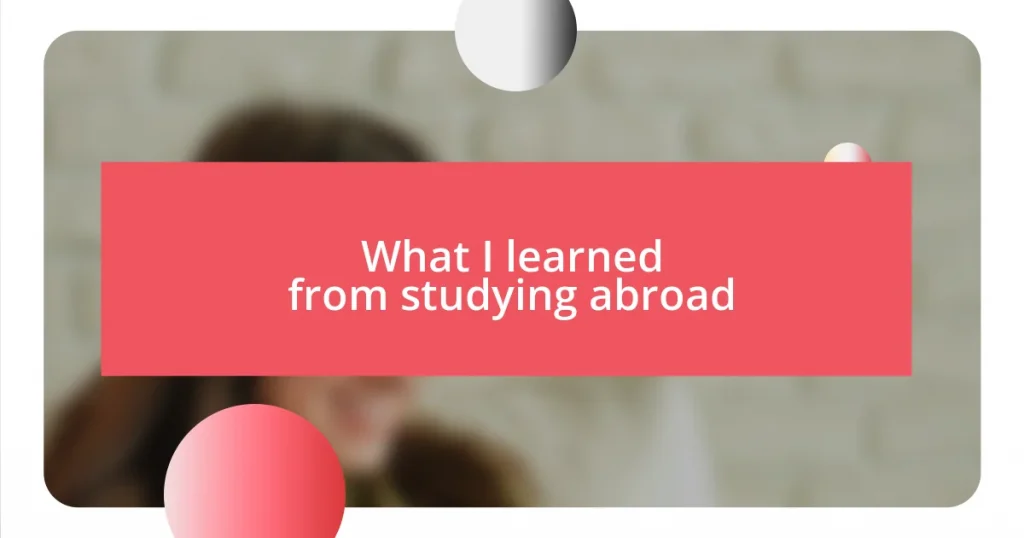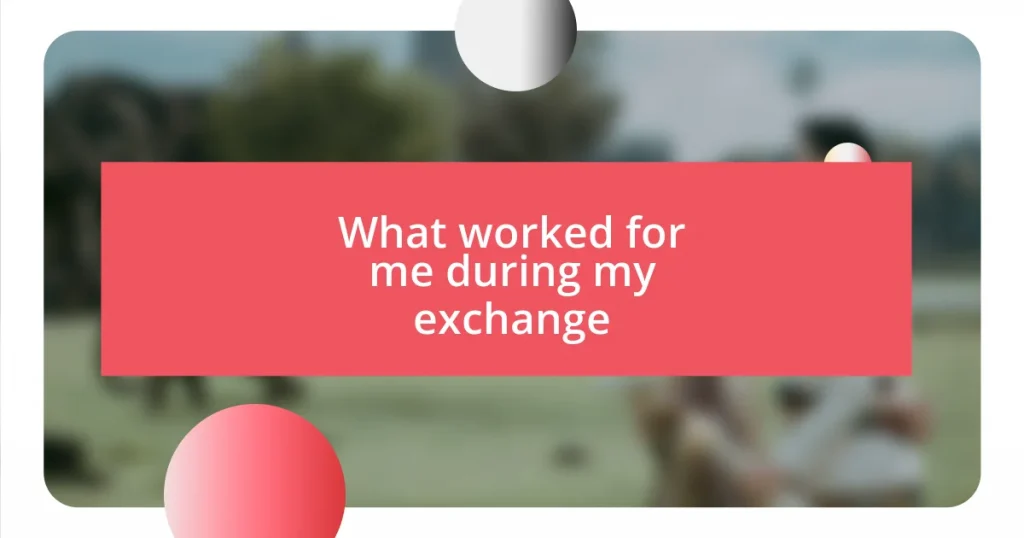Key takeaways:
- Flashcards enhance learning by promoting active recall and can be customized for various subjects and learning styles.
- Effective organization strategies, such as categorization and color-coding, improve retention and streamline study sessions.
- Utilizing spaced repetition and self-testing methods boosts memory consolidation and helps track progress for continuous improvement.
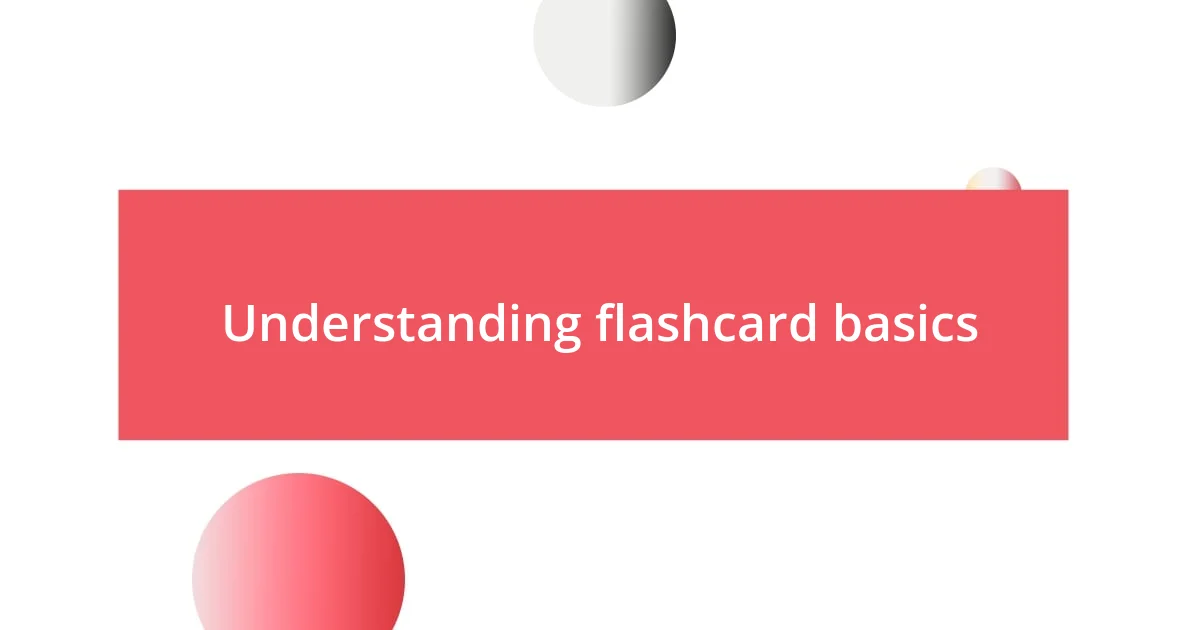
Understanding flashcard basics
When I first started using flashcards, I found them to be an incredibly versatile study tool. They’re not just about rote memorization; they allow for interactive learning, which adds depth to the study process. If you think about it, how often do we truly engage with material? Flashcards push us to actively recall information, promoting a more profound understanding.
Another fundamental aspect of flashcards is their adaptability. You can customize them to fit any subject or skill level, which I love. For example, when I was gearing up for a major exam, I crafted flashcards that highlighted key concepts and terms instead of just definitions. It transformed my study sessions from mundane to dynamic, allowing me to quiz myself in a way that felt less like studying and more like a game. Have you ever tried this approach?
Lastly, it’s worth noting the science behind flashcards. The method of spaced repetition—that is, reviewing cards at increasingly longer intervals—can significantly enhance retention. I’ve noticed that when I spaced my review sessions, my confidence increased, and I felt less overwhelmed. It’s like giving yourself little mental breaks while still reinforcing knowledge. Isn’t it empowering to learn in such a structured yet flexible way?
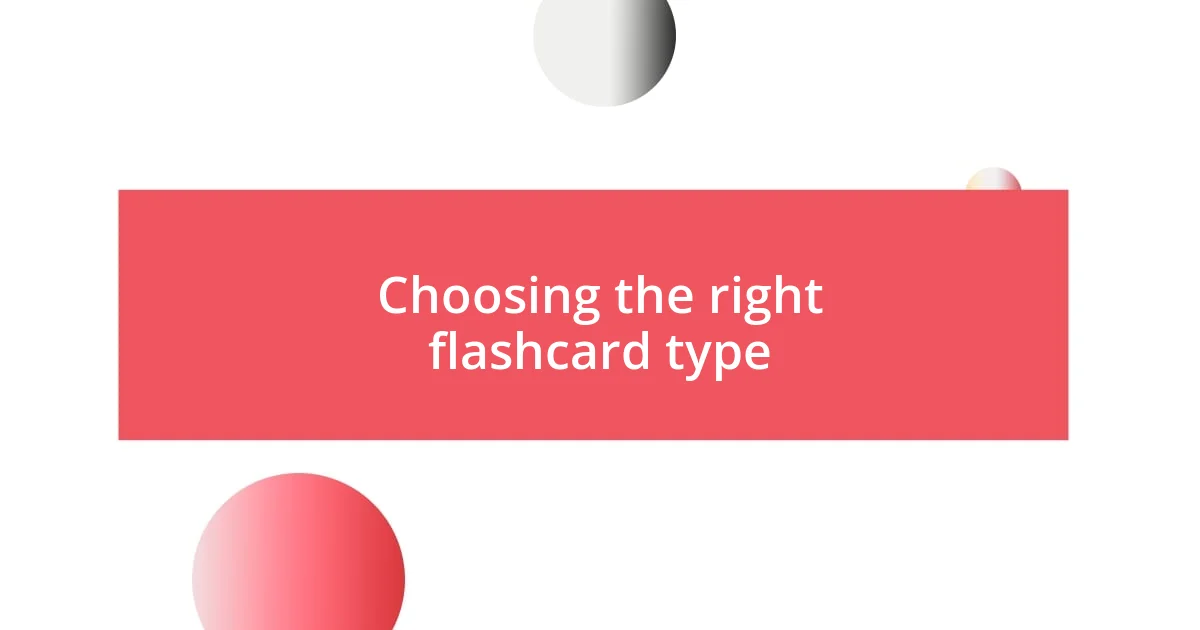
Choosing the right flashcard type
Choosing the right type of flashcard can make all the difference in how effectively you study. I remember a time when I relied solely on traditional paper flashcards, thinking they were my best option. However, once I discovered digital flashcards, my study sessions transformed completely. The ability to include images, templates, and even audio made the material much more engaging. In my experience, the right card type can cater to various learning styles, whether visual or auditory.
Here are some types of flashcards to consider:
- Traditional Paper Flashcards: Great for tactile learners; the physical act of writing helps with memory retention.
- Digital Flashcards: These can incorporate multimedia elements. I’ve found platforms like Anki or Quizlet allow me to share my decks easily.
- Image-Based Flashcards: Perfect for visual learners. I often use infographics to connect concepts at a glance.
- Audio Flashcards: I struggled with language learning until I started using cards that included pronunciation. Listening reinforced my learning in a powerful way.
- Interactive Flashcards: With quizzes or game features, these keep me engaged and motivated.
Finding the right type is essential. Tailoring my approach based on what works for me opened new pathways of understanding that I never knew existed.
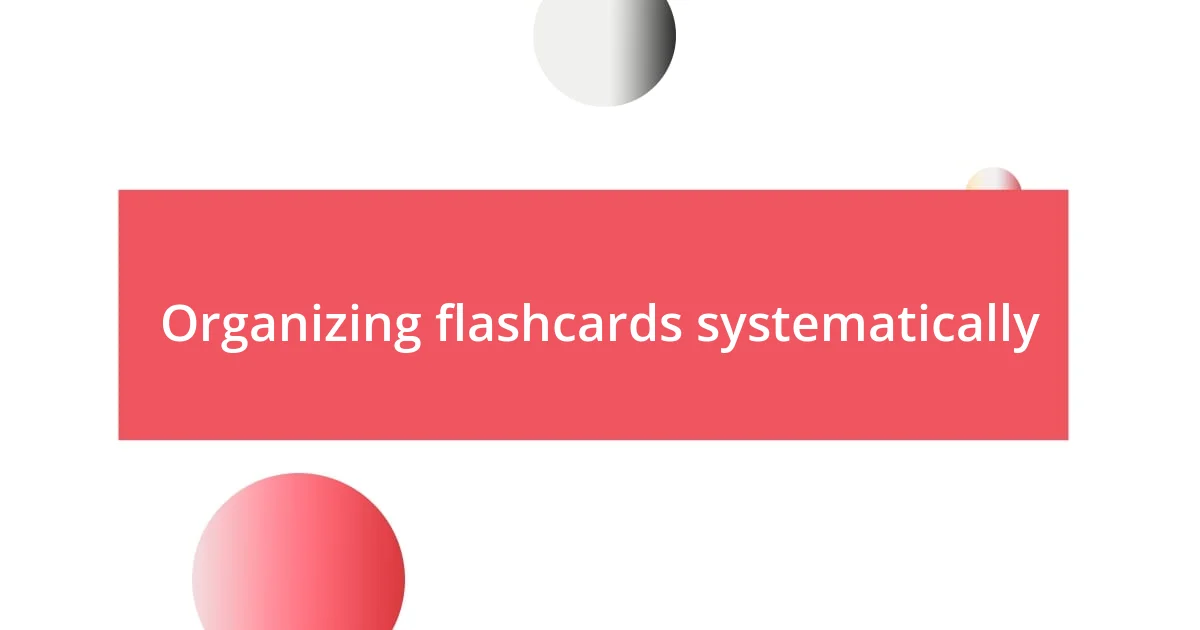
Organizing flashcards systematically
Organizing your flashcards systematically is a key strategy that enhances both retention and recall. I always find it beneficial to categorize my flashcards by subjects or themes. For instance, when I was revising for a history exam, I grouped my cards by era or significant events. This method not only simplified my review sessions but also allowed me to draw connections between different topics. Don’t you think having everything organized in a logical order makes the study process feel more manageable?
Another technique I often employ is prioritizing flashcards. I create separate stacks for those I know well and others that require more attention. This method reflects how I approach time management in my studies. I remember feeling overwhelmed when I used to review everything equally. Now, focusing on challenging cards gives me a sense of accomplishment as I gradually conquer tougher concepts. Isn’t it rewarding to see your progress?
Additionally, color-coding flashcards has been a game-changer for me. By assigning specific colors to different categories or concepts, I can quickly identify areas that need more work. It’s almost like a visual cue that simplifies my study routine. When I see a blue card, I know I’m diving into math, while a green card might signal language practice. This quick identification aids in a more directed and effective study session, making the learning experience feel less daunting and more organized.
| Organization Method | Benefits |
|---|---|
| Subject Categorization | Enhances thematic connections, reducing overwhelm |
| Stack Prioritization | Focuses attention on challenging material, builds confidence |
| Color Coding | Offers quick visual cues for efficient study sessions |
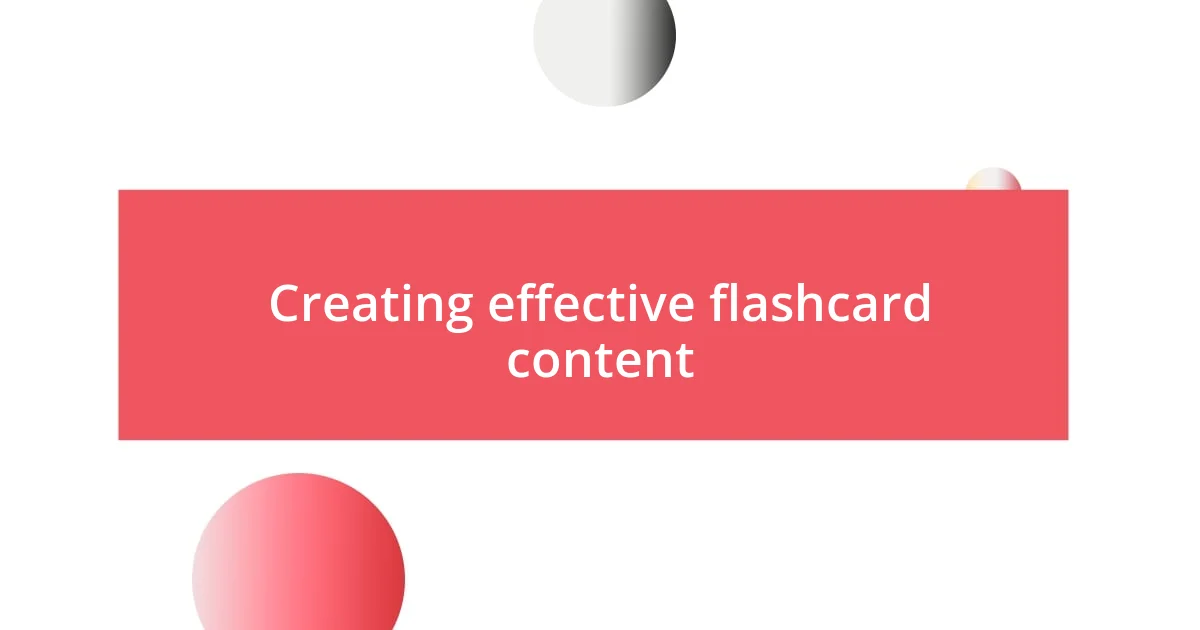
Creating effective flashcard content
Creating effective content for your flashcards is essential for maximizing your study sessions. I always aim for clarity and brevity in my cards. For example, I try to limit each card to one key concept or term. This practice helps me focus, making it easier to absorb and recall information later. Have you ever found yourself overwhelmed by too much information on a single card? I certainly have, and it only led to confusion.
I often incorporate visuals whenever possible. When I was studying biology, I included diagrams of plant cells next to definitions. This combination engaged both my visual and verbal memory, enhancing my understanding considerably. It’s fascinating how a simple image can provide context and make the material stick better. Have you tried using pictures? I would love to hear how that’s worked for you.
Another useful strategy I apply is using questions for prompts. Instead of just stating facts, I reframe them into questions on my cards. For instance, instead of writing “Photosynthesis occurs in chloroplasts,” I’d ask, “Where does photosynthesis take place?” This approach turns passive studying into an active recall exercise, making me feel more involved in my learning process. Does that resonate with you? I find it transforms my flashcard sessions into engaging quizzes rather than mundane rote memorization.
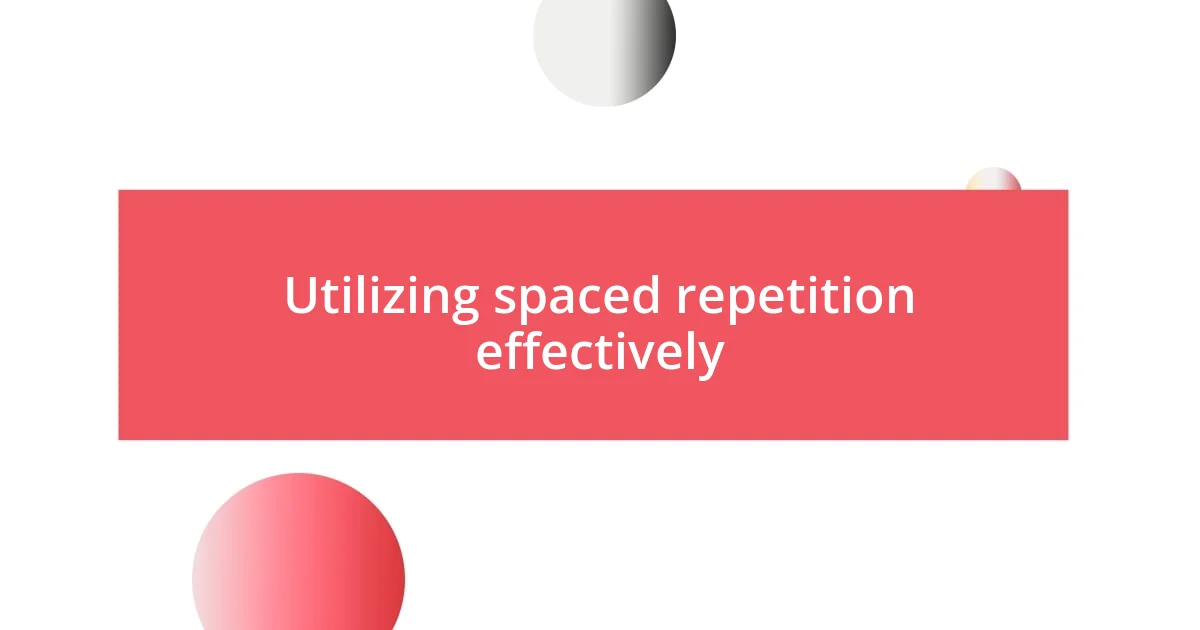
Utilizing spaced repetition effectively
Utilizing spaced repetition effectively
One of my favorite ways to make spaced repetition work for me is by using an app that schedules my flashcards for review. When I first started, I was amazed at how much more I retained when the app reminded me to study cards just before I was likely to forget them. It’s like having a personal study coach that knows just when I need a little nudge! Have you ever noticed how revisiting concepts at the right time can make all the difference in your retention?
Another practice I’ve adopted is marking my flashcards with different levels of difficulty. When I find a card easy, I’ll review it less frequently, while more challenging cards are scheduled for more regular sessions. It’s empowering to witness how these patterns evolve. Remember that feeling when a tough concept suddenly clicks? It’s exhilarating, and it’s a direct result of consistent, spaced practice.
I also make it a habit to review flashcards right before bed. I read somewhere that learning just before sleep can enhance memory consolidation, and I can’t help but agree based on my experience. Waking up to recall a concept I studied the night before always feels like a victory. Have you ever tried studying before bed? It’s a surprisingly effective strategy that has transformed my approach to learning.
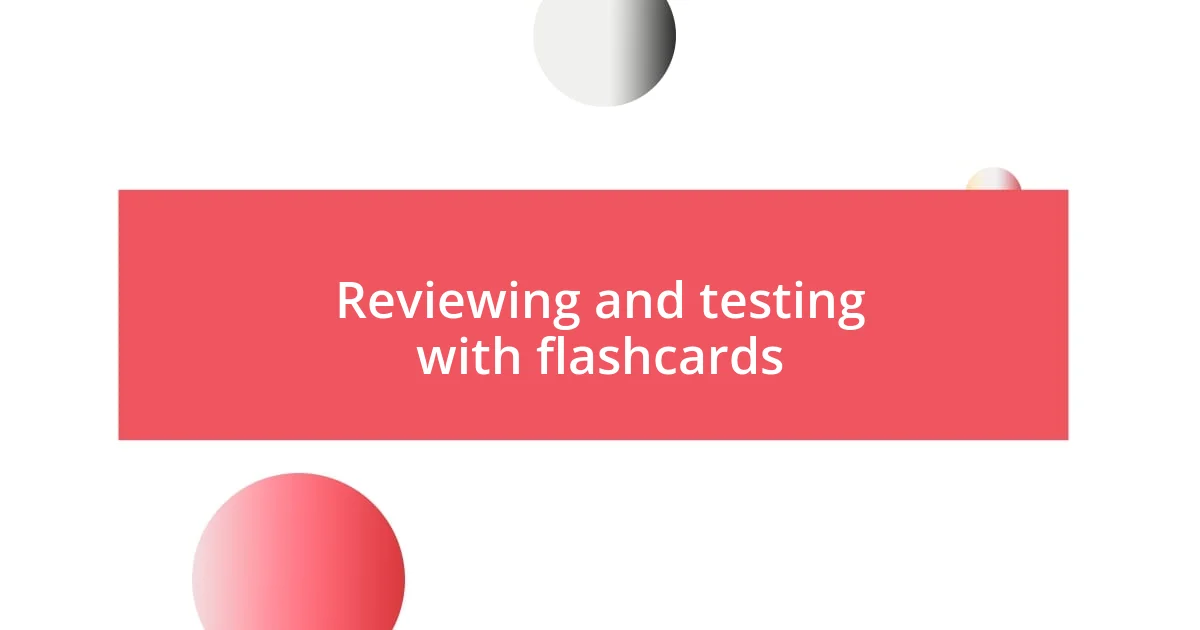
Reviewing and testing with flashcards
When it comes to reviewing and testing with flashcards, I’ve found that setting aside dedicated time for these activities is crucial. I usually start my study sessions by going through my cards in a relaxed environment. There’s something calming about sitting in my favorite chair, holding those cards, and absorbing the information. Have you ever noticed how your surroundings can affect your focus? Creating that comfortable space makes me more productive.
I also love incorporating a self-testing approach into my flashcard routine. As I flip each card, I challenge myself to recall the answer without looking. It adds a thrill to the experience—almost like a mini-game! I still remember when I nailed a particularly tough concept on my first try; that sense of achievement was unbeatable. How rewarding is it to uncover knowledge you weren’t sure you had?
Moreover, I regularly switch up my review methods to keep things fresh. Sometimes, I pair up with a study buddy and quiz each other, which brings a fun social element to the process. Other times, I mix in a bit of technology by using flashcard apps that allow for gamification. The competitive edge can really drive motivation! What about you? Have you tried teaming up or using tech to enhance your study sessions? It’s fascinating to see how varied approaches can truly enrich the learning experience.
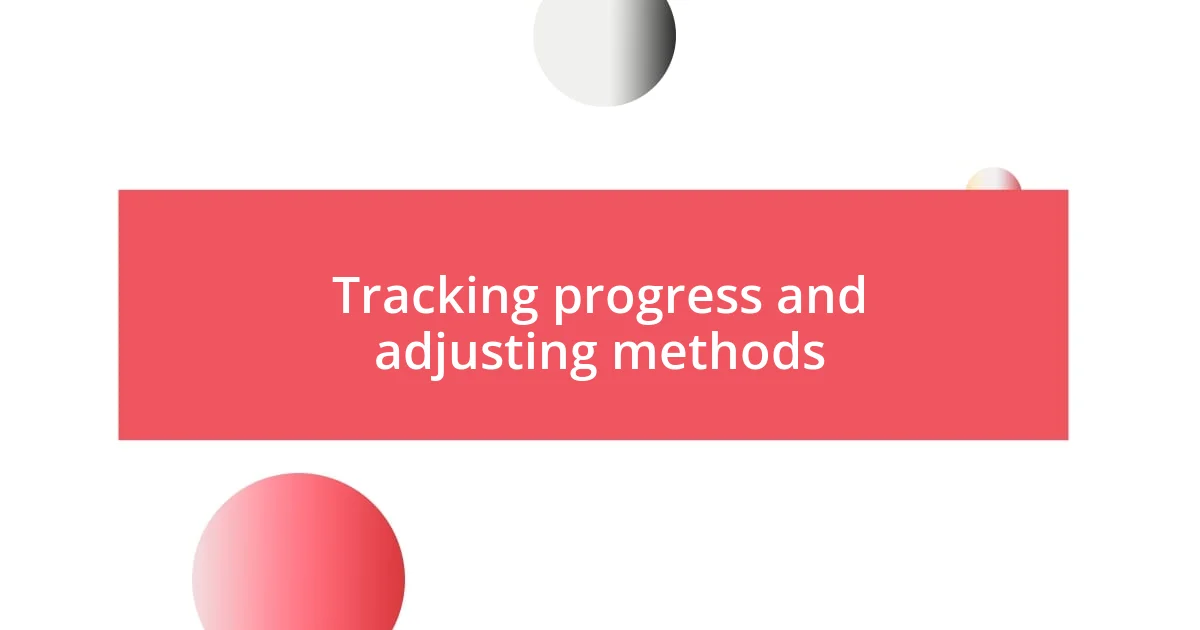
Tracking progress and adjusting methods
To effectively track my progress with flashcards, I like to keep a simple journal noting which cards I find challenging and which ones I breeze through. By reflecting on these patterns, I can pinpoint where I need to focus more energy. It can be surprising to see how some concepts that once seemed daunting turn into strengths over time. Have you ever thought about how tracking your learning can lead to discovering hidden areas of improvement?
Adjusting my flashcard methods based on my progress is something I consider crucial. If I notice that I’m consistently struggling with certain cards, I’ll change my approach—adding more visuals or breaking down the information into smaller bits. It’s amazing how a little tweak can make a huge difference. I remember feeling frustrated struggling with a particular subject, but once I adjusted to a more visual method, it clicked. Isn’t it empowering to find the key that unlocks your understanding?
Additionally, I find it helpful to set specific goals for my flashcard sessions. For instance, I might aim to master ten new cards every week, adjusting my review frequency based on my success. Celebrating those little victories—like finally conquering that tricky set—fuels my motivation further. Have you tried setting goals? I believe that having clear milestones can transform the study experience into something much more rewarding.








